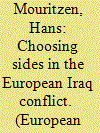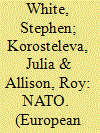|
|
|
Sort Order |
|
|
|
Items / Page
|
|
|
|
|
|
|
| Srl | Item |
| 1 |
ID:
074369


|
|
|
|
|
| Publication |
2006.
|
| Summary/Abstract |
Focusing on the Euro-Atlantic conflict over the Iraq war operation in early 2003 (the 'European Iraq conflict'), the purpose of the present article is to explain the pattern of Atlantic (vs. Continental) predispositions among European countries. It argues that this is the best suited conflict in the post-Cold War era to illuminate this stable and fundamental pattern. Whereas systemic power distribution, size, public opinion, or government ideology all fail to account for the positioning of states in the conflict (and balance of threat applies only modestly), a theory of 'past and present geopolitics' is outlined that seems able to explain states' predispositions and, hence, their positionings in this specific situation. It is remarkable that 'old-fashioned' geopolitical dynamics can be identified even within the Euro-Atlantic zone of 'peace and prosperity'-not only at its fringes, but also in its very heart.
|
|
|
|
|
|
|
|
|
|
|
|
|
|
|
|
| 2 |
ID:
074368


|
|
|
|
|
| Publication |
2006.
|
| Summary/Abstract |
Employing the notion of 'rhetorical entrapment', this article offers a discussion of Ukraine's EU membership prospects. It argues that while, for material reasons, the EU may want to keep Ukraine at arm's length, normative commitments made earlier may compel it to offer much more. The study first looks at the domestic situation in Ukraine in light of the country's call for accession talks to be opened in 2007, before it goes on to analyse the distribution of support for and opposition to the Ukrainian membership perspective among the EU member states.
|
|
|
|
|
|
|
|
|
|
|
|
|
|
|
|
| 3 |
ID:
074372


|
|
|
|
|
| Publication |
2006.
|
| Summary/Abstract |
This article explores the impact of the EU Code of Conduct on Arms Exports on national legal frameworks, using the case studies of Belgium, Germany and Italy. It considers the differential impact of Europeanisation on high- and low-regulating countries and how non-legally binding decisions agreed in the framework of the CFSP nevertheless exert pressure on member states. It argues that the Europeanisation impact of the Code has not been insignificant, but that it has not had a uniformly strengthening impact. Rather, the Europeanisation of the Code of Conduct has promoted convergence, weakening strong national frameworks and strengthening weak ones.
|
|
|
|
|
|
|
|
|
|
|
|
|
|
|
|
| 4 |
ID:
074370


|
|
|
|
|
| Publication |
2006.
|
| Summary/Abstract |
Relations between Russia, Ukraine and Belarus and NATO have placed more emphasis on cooperation than confrontation since the Cold War, and Ukraine has begun to move towards membership. At the popular level, on the evidence of national surveys in 2004 and 2005, NATO continues to be perceived as a significant threat, but in Russia and Ukraine it comes behind the United States (in Belarus the numbers are similar). There are few socioeconomic predictors of support for NATO membership that are significant across all three countries, but there are wide differences by region, and by attitudinal variables such as support for a market economy and for EU membership. The relationship between popular attitudes and foreign policy is normally a distant one; but in Ukraine NATO membership will require public support in a referendum, and in all three cases public attitudes on foreign policy issues can influence foreign policy in other ways, including the composition of parliamentary committees. In newly independent states whose international allegiances are still evolving, the associations between public opinion and foreign and security policy may often be closer than in the established democracies.
|
|
|
|
|
|
|
|
|
|
|
|
|
|
|
|
| 5 |
ID:
074371


|
|
|
|
|
| Publication |
2006.
|
| Summary/Abstract |
Central and Eastern European countries have made significant progress in their efforts to democratize postcommunist civil–military relations. Appointing civilian ministers of defense, improving institutional arrangements and asserting legislative oversight over the armed forces have been key priorities. Problems still abound and levels of reform vary in the region even after NATO's second enlargement since 1989. Challenges remain concerning competent democratic civilian management, and effective defense reform planning and implementation. This article argues that the lack of an integrated Ministry of Defense, the low level of civilian interest in defense matters, the reform-deterrent attitude of political and military elite, and ambiguous institutional lines of authority are factors that still hamper civil–military relations in Bulgaria. I assert that the domestic political environment and international factors together facilitate democratic civilian control over the armed forces.
|
|
|
|
|
|
|
|
|
|
|
|
|
|
|
|
|
|
|
|
|